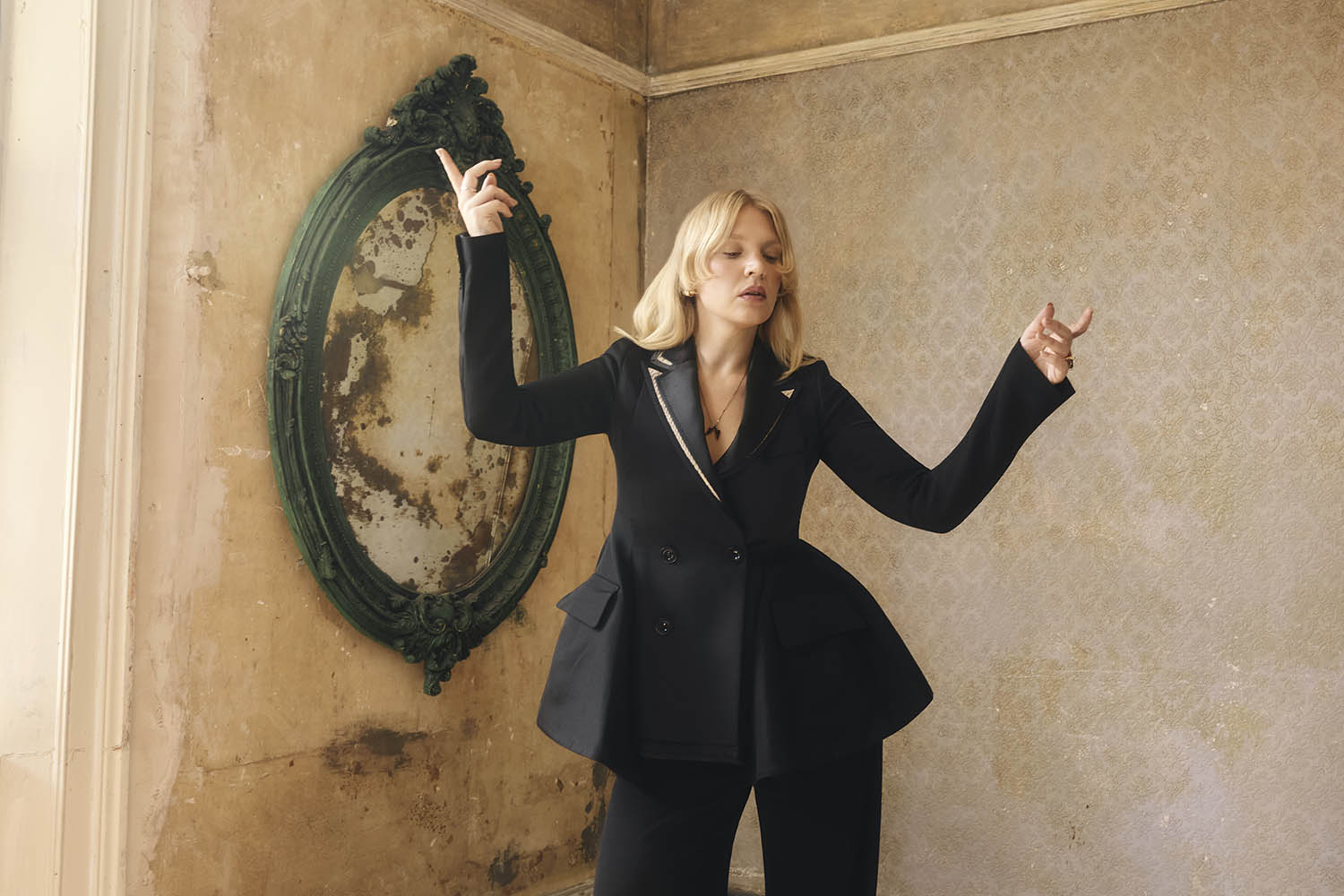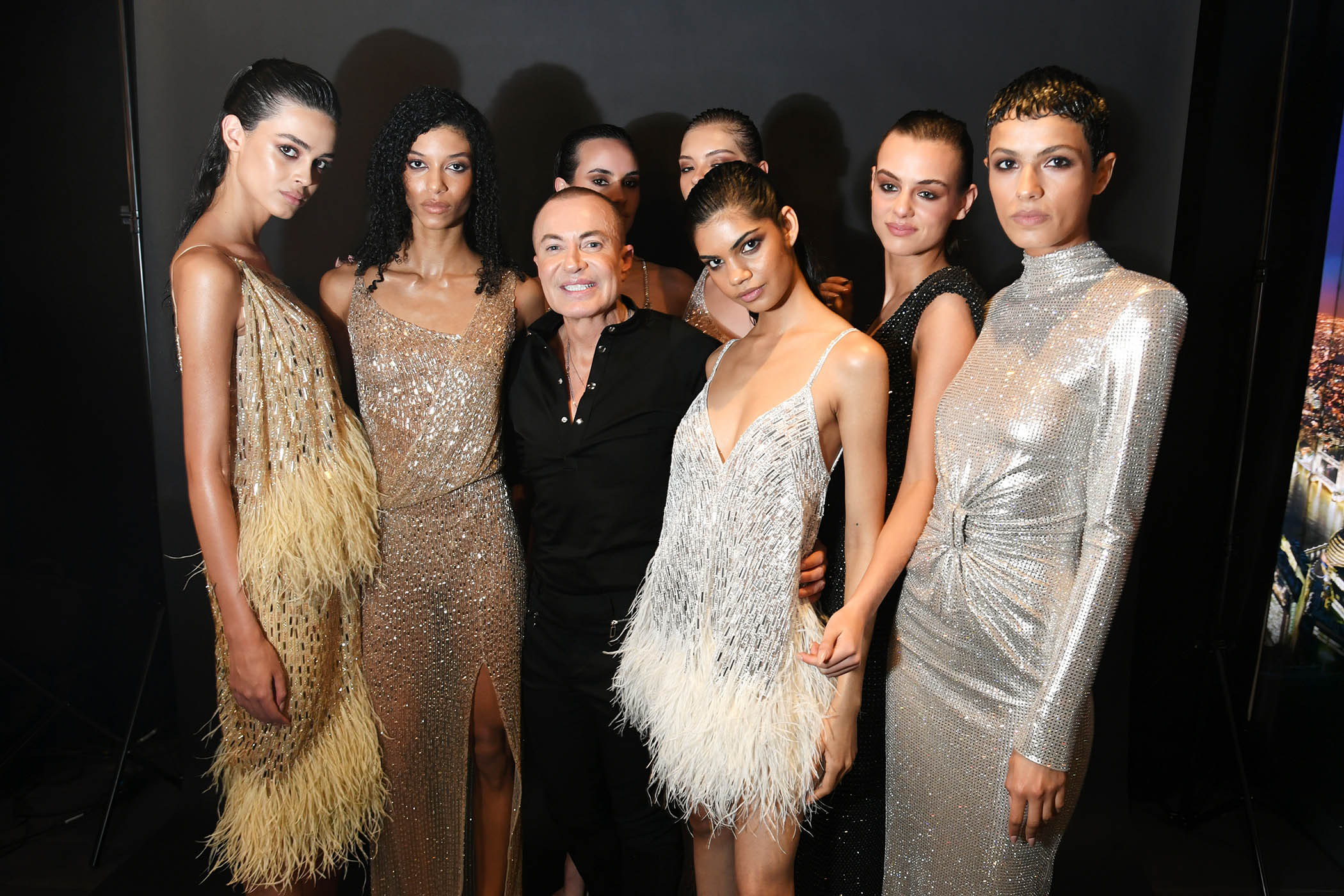Photographs by Zoe McConnell
In a story threaded through a new book of poetry by Rebecca Lucy Taylor (better known as the musician Self Esteem), she fantasises, at length, about going missing. There’s a press conference, rumours, headlines. “As long as Dua Lipa, Rita Ora, Laura Marling or Florence aren’t missing that month,” she writes, “I would make the home page for sure.” Predictably and quite quickly her Spotify streams soar, her record label is thrilled (“Not too thrilled though, obviously”) and Self Esteem begins to receive the press Taylor has always dreamed of. The case deepens. Has she been kidnapped, murdered? Police check her social media to analyse how much validation she was craving that night; might she have gone off to have sex with some lad off her phone? “Sarge,” one policeman whispers to another. “Is it possible she might have searched for her own music at the karaoke bar?” “Look, I’m not gonna sugar-coat this: yes. It is.”
Today, Rebecca Lucy Taylor is very, completely present and alive. The week before Glastonbury, in a warehouse out by London City Airport, she is leading her troupe of 10 dancers through a merry rehearsal. At the end of a song, panting, Taylor calls, hopefully, “And the crowd goes mild!” Which of course was an understatement – that Friday night thousands of people shouted her lyrics into the sky while she sang big, weird tender songs about sex, gender and drinking, holding hands with the girls and leaping, dancing. In Sheffield, in her 20s, Taylor was told to stand still on stage. She was in a punk band – she was in a lot of bands, the most enduring being indie-folk group Slow Club – where she was instructed to stand still next to the male singer and look pretty. It inspired her to recreate herself in 2017 as Self Esteem, to encourage her own confidence, that realisation that musicians she’d worked with previously “only really wanted the weather of a woman. They don’t want you.”
Self Esteem became a self-fulfilling prophecy. In 2019 her debut album Compliments Please was released to critical, rather than commercial, acclaim. But then in 2021 came her commercial breakthrough with Prioritise Pleasure, its biggest hit being a hypnotic monologue called I Do This All the Time that includes notes-to-self like, “Don’t be intimidated by all the babies they have. Don’t be embarrassed that all you’ve had is fun… Don’t send those long paragraph texts. Stop it, don’t.” It’s become a quiet, radical anthem, shared in women’s WhatsApp groups – the first time I heard it I cried in a car. Alongside her feminist theatrical art-pop, Taylor became a camp pop-culture presence, cheeky and stunning, on prime-time TV and acting in the role of Sally Bowles in Cabaret. She also composed the soundtrack for Prima Facie, a play about sexual assault starring Jodie Comer. But there was this prickle, this prod in her back, the sense she needed to be bigger, poppier, more successful. And all the time she was writing short verses in her Notes app, like:
9 December 2017
If I’m honest, I’m struggling. But I won’t be honest, don’t worry
After rehearsal, over a very cold beer, she describes a typical day. “Mental health podcast in the morning, then car to the ball pit at Radio One. And then maybe Would I Lie to You? after lunch? Code switching is… exhausting.” She’ll go home to her boyfriend’s flat tonight and be, “Completely mute. Like, ‘I can’t switch to being “girlfriend” now, don’t you start!’” It’s not that she’s not enjoying it, this pop star life, so much as, she’s weighing up what she wants compared to what she thought she should want. When I Do This All the Time became a hit, her horizons as a writer and actor suddenly expanded, “But I thought – don’t ruin everything you’ve built by spreading yourself too thin.” Playing it at a recent run of shows in London (Madonna in the audience, called her, later, “an incredible artist”) she found herself crying on stage, revisiting a memory from five years earlier, “I just felt unbelievable anger all over again. It’s never over, is it? But,” she grins, gamely, “we’re on the go! Sell some more albums! Buy more perfume out of it!” Recently, she says, she got a really posh candle.
When her anxiety started to get “daft” recently, she took herself off on her first yoga retreat. She’d never been able to afford one before. It was linen and sound baths and singing round a campfire. “I had this moment where I was like, ‘This makes my skin crawl, but if I was a normal person, this is probably really beautiful?’” But it helped. It helped! The retreat gave her space to work out what she wants right now. Eight years ago she sat down with her record company and said she wanted to be the biggest artist in the world. Now, at 38, she’s planning to tell them, actually, she’s changed her mind. First there’s the difficult fourth album to write though, and in between the small talk, the smiling, “I can feel a sort of freedom bubbling.”
On a thick-aired July morning a few weeks later, I arrive at her flat in east London to find a comically large silk ribbon around the front door. You see, she’s just moved in. She got the keys yesterday. Inside there are two camping chairs, a grotty sofa bed the previous owners left behind, a track of Blu Tack on a forlorn Billy bookcase and absolutely nothing else, and Taylor is giddy with joy – this is the first place she’s owned after years of flatshares and overdrafts and landlord-ordered white emulsion. Her boyfriend Wilf (tall, in love, moving in imminently) says goodbye, and, as if throwing down her cape over a puddle, she spreads binbags across the crawling sofa bed for us to sit on. “I’m a lot happier than when I last saw you,” partly because she’s figured out the next record – she holds out her hand as if the concept is an egg, balanced. “It’s been really punishing in my brain,” but medication has helped. As has a concerted effort to reduce the “insane pressure I’d put on myself to be a global big pop artist – I’m not Dua Lipa, I’m 38 and from Rotherham!”
Earlier that week, she’d been watching the Lionesses penalty shootout at her boyfriend’s flat – it was a humid evening, so by the end of the match she was naked, and when they won, her song If Not Now, It’s Soon played, a surprise. She leapt into the air, ecstatic. She’d written the song with a goal montage in mind, the kind of music you can bound up an escalator to. “I didn’t think anything could change in my lifetime. As a little girl, I couldn’t have gone ‘I want to be a footballer.’ And now there are roles for women in a whole industry that I hope is only going to get more affluent, so I’m like, if that was possible, what else could happen? I often feel like I’m all limescaled up inside, like nothing’s moving again. But things can change. And it’s very simplistic, but – it’s hope.”
9 June 2018
Look, I’m going for a piss and when I get back I need you to understand me completely and utterly
Something else that’s changed is, she’s coming to terms with a new broodiness. “Against my will! I suddenly want to… love something loads.” When her friends talk about their children, she’s pounded with memories of her childhood. “It’s a bit like a mad, late-onset love for myself as a kid, which is powerful, but kind of heavy.” Six months ago she froze her eggs, an expensive, gruelling process that slightly spun her sideways as she felt herself losing control of her body, physically and mentally. “Watching men in bands have children and it not affecting their careers is so constantly hot in my heart as unfair. I started to wonder, what is good about being a woman? My friend was like, I don’t know, the clothes?” She felt a new kind of resentment towards her partner, “and I’m already angry enough about being a woman!” A good chunk of her music to date has been insisting that she’s OK on her own. Surviving the bad boyfriends, the heartbreaks, the oppressive music industry, “That’s like my main MO. But it would feel wrong to not write about the fact I am letting something in now. Which has been really hard. But – I realised I could write a concept album about, sort of, reluctant love.”
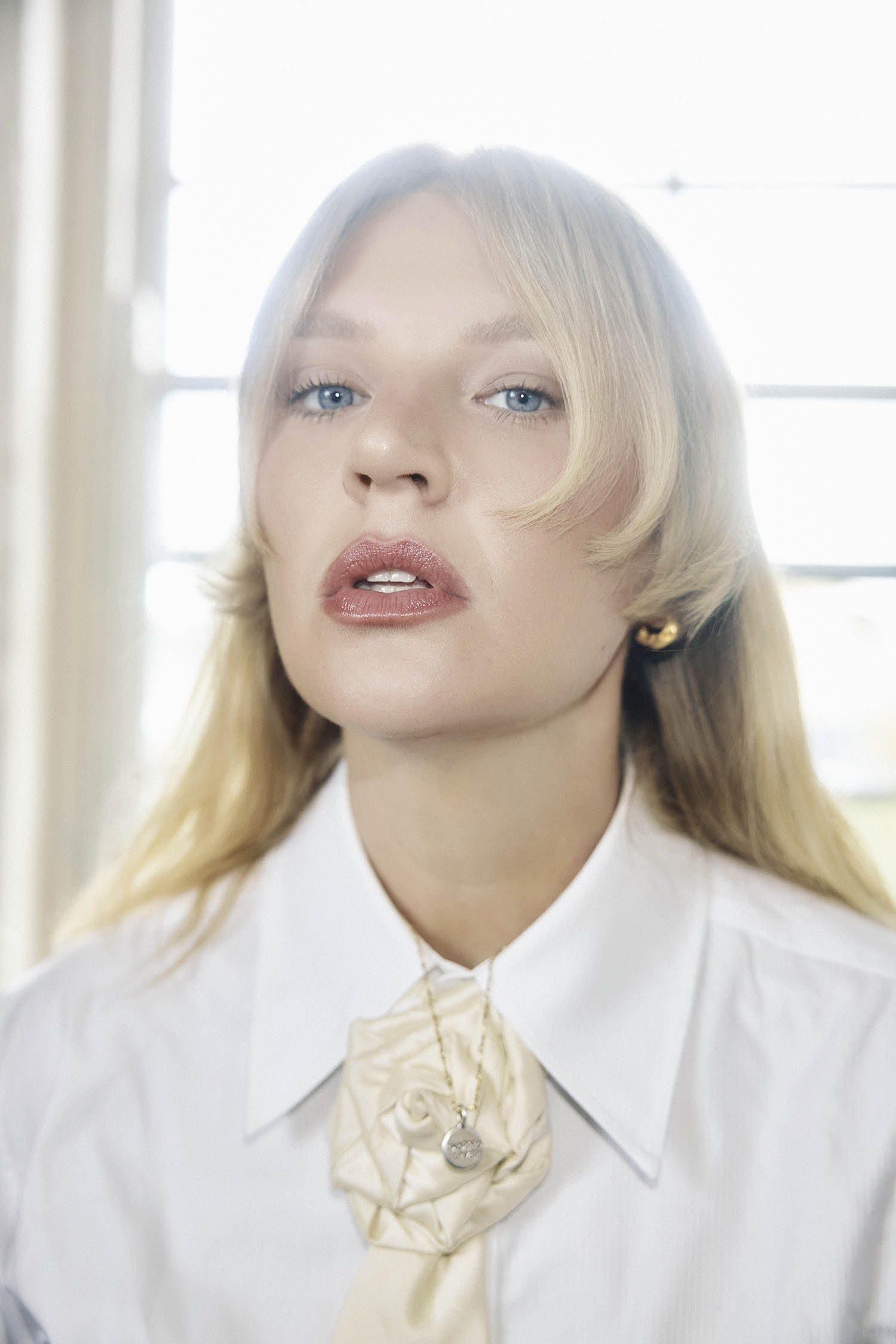
Shirt by Toga; ivory tie by Horti; earrings by Completedworks; and necklace, her own
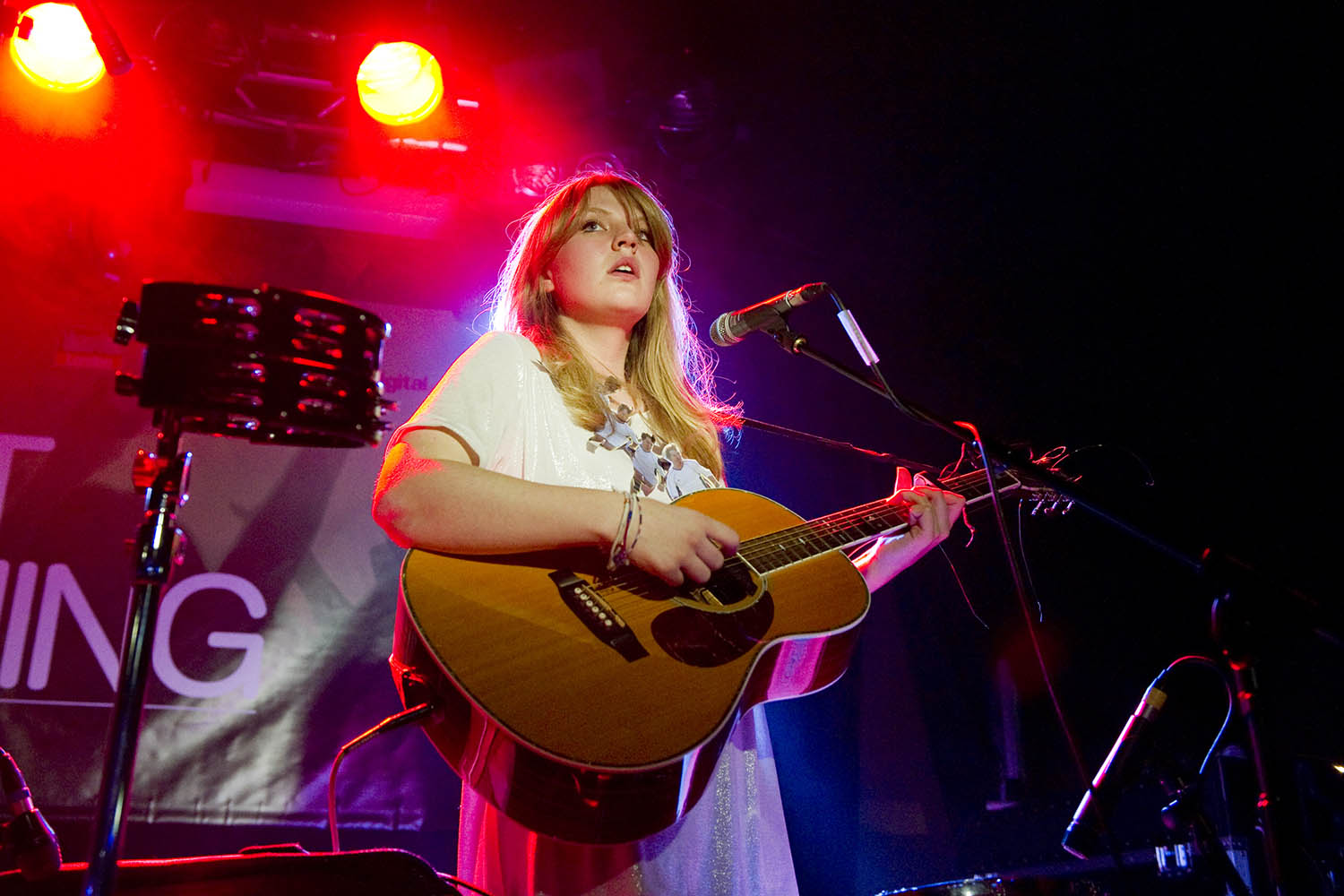
Onstage with Slow Club in London, 2010. Photo by Barney Britton/Redferns
In her chat as in her songs, it’s Taylor’s ability to pick through the dark grey areas of women’s lives with wit and pathos that’s led to her connect with fans who roar tearily along to choruses like, “If I’m so empowered / Why am I such a coward?” “I love that the music helps other people,” she says, “but that’s not what I set out to do. I’m not that nice.” What she is, is obsessed with the decade or so in her life where she felt like shit, where indie audiences would shout for her to get her tits out, and she felt too fat and too poor, until, eventually, she launched Self Esteem, came out as bisexual, and “became myself”. The grander project is about articulating love for 25-year-old Taylor, “And I’m so angry, and so obsessed with making sure I avenge her. It’s weird to realise other people feel the same.” Making the music feels to her a bit like everyone getting home and taking off their bras at once, breathing out, “A mass ‘undoing our top button’ feeling”. If she wasn’t a musician, the project would still remain in some form. But, “I guess it would just be me being the friendliest girl in the office.” Ten minutes with Taylor and it’s clear she’s the one holding your hair back when you’re sick in the toilets.
1 September 2024
Anything can be leave-in conditioner if you try hard enough
She wrote Prioritise Pleasure really fast during the pandemic, having moved home to Rotherham with her mum (a secretary) and dad (who worked in a Sheffield steel plant as a health and safety officer) in her old bedroom which felt suddenly dollhouse-sized. Her third album, A Complicated Woman, was slower and trickier and yes she’s proud of it, but also, the process, “kicked me in the tits a bit.” She swigs her beer. “We used to go to this caravan for two weeks every summer. By the end of the first week I’d just be sobbing about it ending – I ruined the holiday every year. That part of my personality is the same – I couldn’t even enjoy the positivity because I knew it was going to end.” Things had been going too well, she thought, people were being too nice. When the overflow of kindness dwindled, “I was like, well I guess my career’s over then! I have anxiety and depression, but pushing through all that seems to be getting harder.” A day like yesterday (meeting, podcast, screening, smiling) wipes her out now in ways it never did before. And small talk. “I can sing in front of a thousand people, but if I’m at a barbecue, I can’t cope. I guess I need to become so successful that I don’t have to make small talk ever again. I can just be Enya, you know? That’s the dream.”
She’s awkward naming it, twisting her legs inside her jogging shorts. “Then you get job security, because I can do the breakup album, obviously. Then my dementia album. My menopause album – that’s going to bang.” There’s life beyond, is what she’s counting on. “Because there’d been this idea ping-ponging around my head – having a baby equals no career, having a career equals no baby. And poor old Wilf was like, well, you’re not factoring me into any of this! Then we had a chat where he was like, ‘You can go to work, I will be mummy.’” She’s grinning now, slightly stupidly. This is what the album will be about, “being open to change.” Which feels good, feels exciting. Now all she’s got to do is change her mind about the meaning of success.
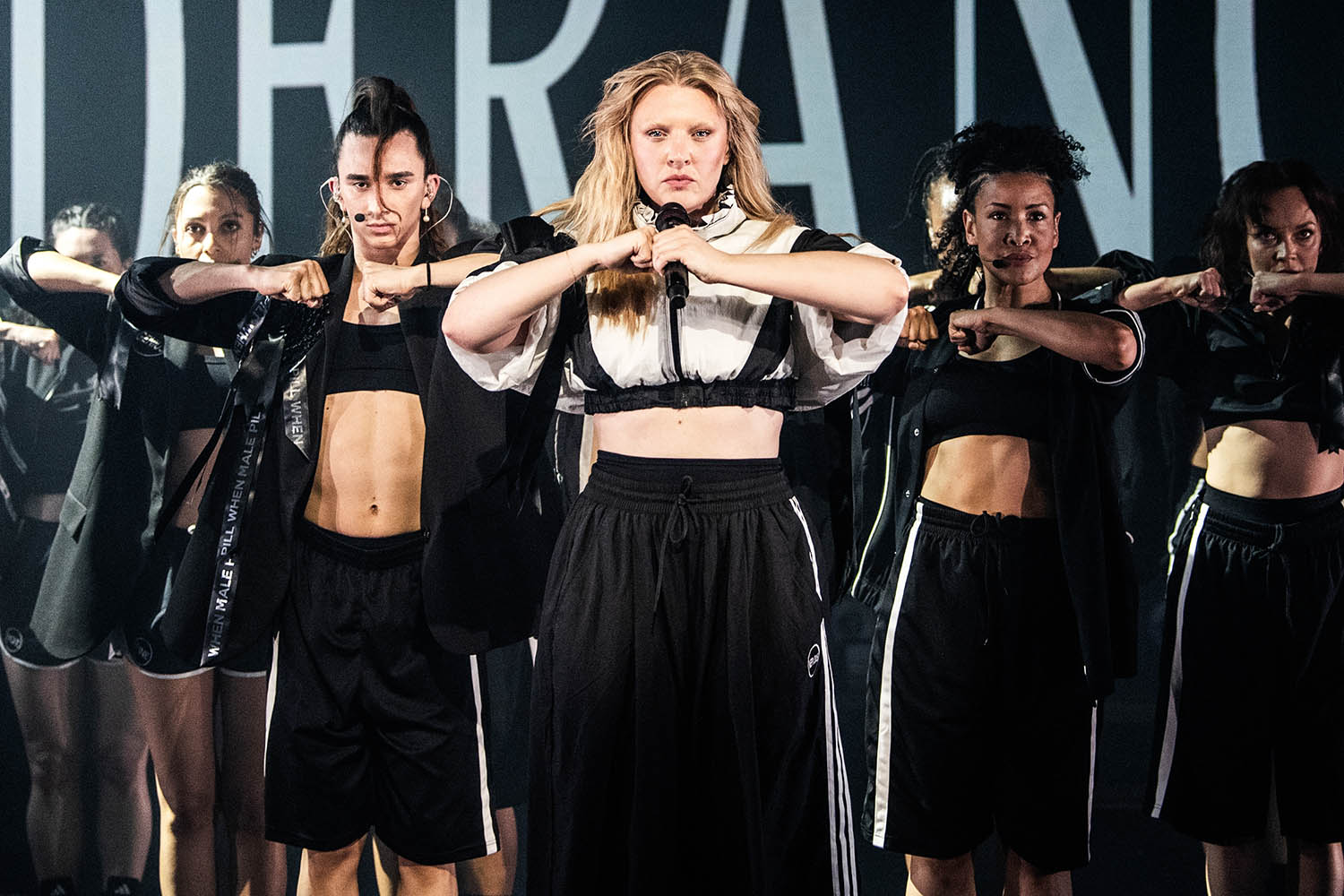
Self Esteem with dancers on her current tour. Photo by Aaron Parsons
30 January 2023
Be a very nice girl and shut up and act like you were born lovely
Every Easter growing up, Taylor would save her chocolate eggs. She’d have a nibble, rewrap, put it away, the aim being to eke out the eggs until Christmas, when she’d get some more chocolate, which she’d then save until Easter rolled around again. They didn’t live in poverty but it wasn’t a lavish life, and it was a life that led, she says, to a “pathological fear of money”, complicated by a career around musicians from far more privileged backgrounds. “When I was a little girl, I had no idea that life was going to be any harder or different for me.” In her mid-20s she realised gender mattered, then soon after, when Slow Club were being lapped by Mumford & Sons and Laura Marling, that class had an impact too. “And I was like, yeah, no wonder I’m so fucking grumpy all the time.” Success for Taylor means becoming, “the kind of rich where I’m not scared any more.” Her ambitions, over the years, have shifted from “massive pop star” to “pop star”. To “being able to not resent how much your hen-do will cost me.” In the shower she’s stopped listening to podcasts, instead talking to herself, saying, “You don’t want to be Katy Perry. You want to make music.”
27 July 2022
How many videos of rugs being cleaned can I watch before I get thoughts of you out of my head? How many delicate biscuits being iced will fry all memory of you?
Some of the verses scattered through the book are very funny, or sweet, and some articulate a universal, feminine wisdom with such ferocity it feels like she’s slapping the reader around the face. Yet until recently Taylor has found it almost impossible to say what she means in real life. “Then, the other day I said 70% of what I thought, to a friend who was disappointed with me. It was beautiful. My therapist was like, that’s massive.” Before, she would have apologised, at length. The book, it so happens, is dedicated to “anyone who is mad with me”. Once she made hats that said, “I’ll pay you not to be mad at me.”
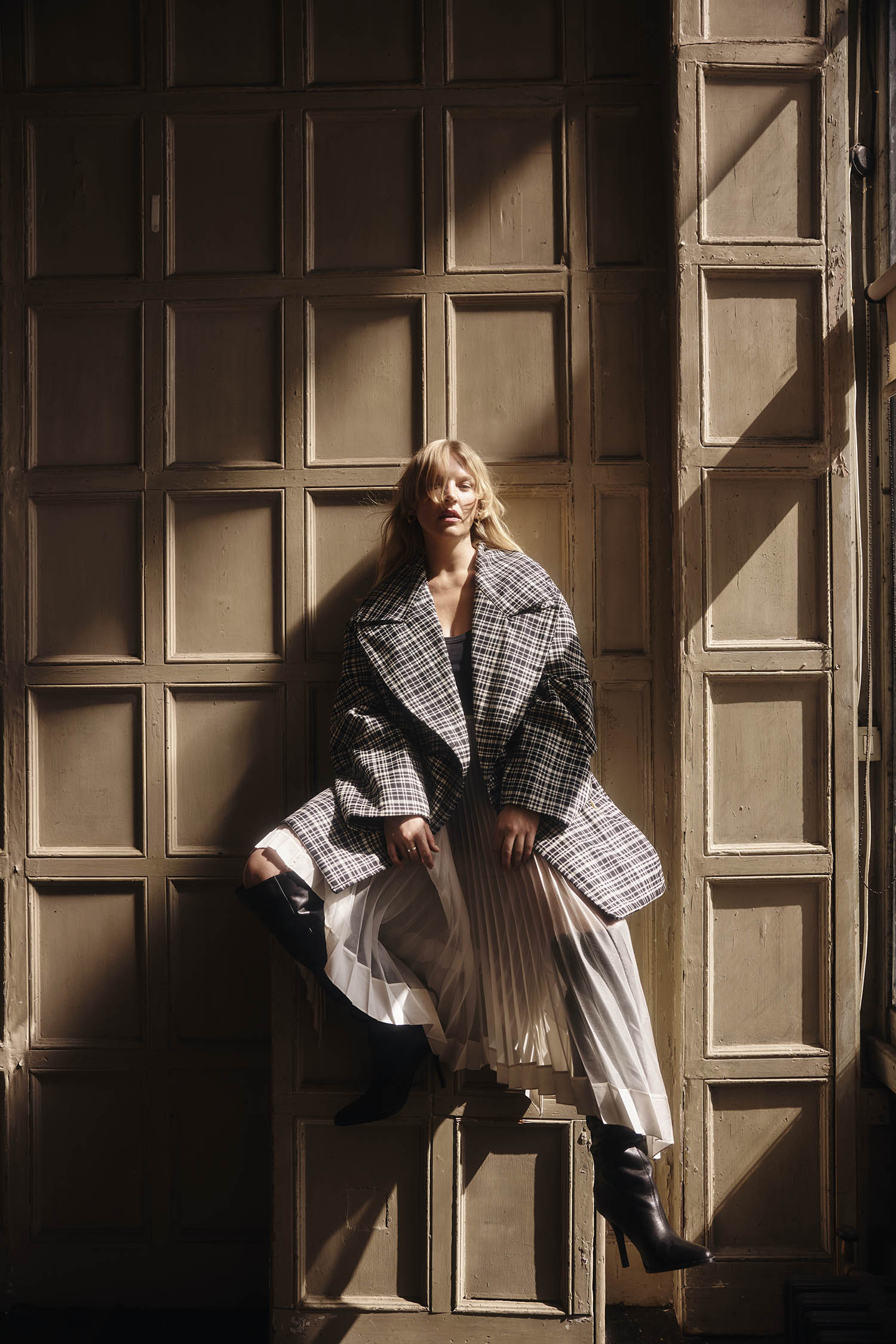
Peacoat skirt and vest, all by SS Daley; boots by Paris Texas; and earrings by 886 by The Royal Mint
Slipped in about halfway through the book is a verse from I Do This All the Time: “26 August 2017 – Best night of your life was the worst of mine.” This is the line that has been making her cry on stage. Because it’s about “something that happened to me that I will never get justice for. And somebody out there doesn’t realise what happened at all.” A while ago she wrote a comedy pilot about a fictional musician who’s sexually assaulted in the first episode, then the assault is never mentioned again. Every development meeting, producers asked to delve deeper into it, but she said no, “Because that’s not what happens at all in real life: 97% of women have experienced sexual harassmentand we just have to keep going. I’ve found that trying to be close to a man has been hard because we are fundamentally not experiencing the world in the same way. My last long relationship was with a woman because there was just an emotional shorthand.”
Why has the song started making her cry now? “Partly because some “body keeping the score” shit is going on. And also, I started thinking a lot about justice.” When she first collaborated on Prima Facie, “it took three years for a rape case to be heard. And now it’s gone to eight. How are we ever going to be equal?”
What’s it like hearing thousands of people singing that line? “It’s amazing. But it’s also sad. I don’t want everyone else to feel like I fucking felt my whole life, but definitely helps me feel less alien or alone” Part of the marketing push to make Self Esteem bigger, more successful, is a drive to reach a younger audience. “But my fan base is 35 and over, and trying to aim younger feels so disrespectful to them, like that age group is not valid. And that’s exactly why I’m saying what I’m fucking saying! It’s fucking joyful and I feel in on it, and they feel in on it with me.”
17 November 2023
Tell me anyone who left when they should have
At the end of the story, young Rebecca Lucy Taylor AKA Self Esteem is discovered hungover and asleep, not by police, but by adult Taylor – in her 30s now – who gazes down with fondness and some disgust, thinking about the time the beautician told her to get 0.5ml of filler put into her lips, wondering whether her career would have gone better if she had, and whether we’re forever guided by the woman of our future and haunted by the girl of our past. She tells her younger self she doesn’t need to apologise. “Do I regret any of this?” she asks after a while. “I do. But I lie to her and say, ‘No, it’s all part of it. You’ve just got to keep trying.’”
Self Esteem is on tour from September. Her book A Complicated Woman (Octopus) is published on 30 October
Opening photo: jacket by Sacai; trousers by The Fold London; necklace and ring by Hannah Martin London.
Fashion editor Jo Jones
Hair by Lauren Bell using BaBylissPRO and Olaplex
Makeup by Byron London using Fenty Beauty
Nails by Abena Robinson at Agency 41 using The Gel Bottle
Fashion assistant Sam Deaman
Digital technician Nick Graham
Lighting assistant Carissa Harrod
•
This article was amended on 24 August. An earlier version said that A Complicated Woman was Self Esteem's second album, when it is in fact her third.
Newsletters
Choose the newsletters you want to receive
View more
For information about how The Observer protects your data, read our Privacy Policy
